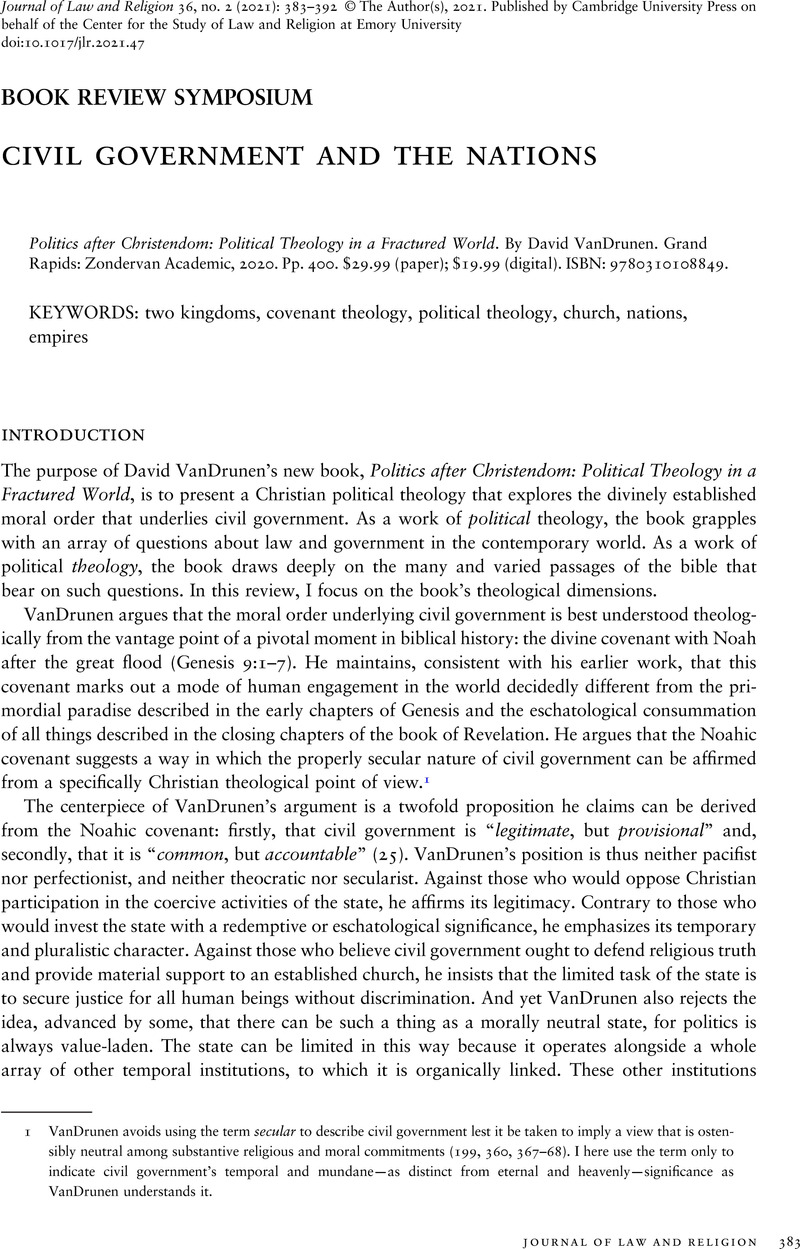No CrossRef data available.
Article contents
CIVIL GOVERNMENT AND THE NATIONS - Politics after Christendom: Political Theology in a Fractured World. By David VanDrunen. Grand Rapids: Zondervan Academic, 2020. Pp. 400. $29.99 (paper); $19.99 (digital). ISBN: 9780310108849.
Review products
Published online by Cambridge University Press: 20 August 2021
Abstract

- Type
- Book Review Symposium: Politics After Christendom
- Information
- Copyright
- Copyright © The Author(s), 2021. Published by Cambridge University Press on behalf of the Center for the Study of Law and Religion at Emory University
References
1 VanDrunen avoids using the term secular to describe civil government lest it be taken to imply a view that is ostensibly neutral among substantive religious and moral commitments (199, 360, 367–68). I here use the term only to indicate civil government's temporal and mundane—as distinct from eternal and heavenly—significance as VanDrunen understands it.
2 For additional references, see pages 100, 122–23, 179–80, 268, 285.
3 See VanDrunen, David, Natural Law and the Two Kingdoms: A Study in the Development of Reformed Social Thought (Grand Rapids: Wm. B. Eerdmans, 2010)Google Scholar.
4 All biblical quotations are from the English Standard Version.
5 See Novak, David, The Image of the Non-Jew in Judaism: The Idea of the Noahide Law, 2nd ed. (Liverpool: Liverpool University Press, 2011)CrossRefGoogle Scholar; Novak, David, Natural Law in Judaism (Cambridge: Cambridge University Press, 1998)CrossRefGoogle Scholar, chapter 6.
6 The text of Genesis 9:4 literally prohibits the eating of the flesh “with its life, its blood” (דמו בנפשׁו). My thanks are due to Leigh Trevaskis for assistance with the Hebrew texts discussed in this review.
7 For additional references, see pages 84, 285, 297. VanDrunen defends what he calls a “polycentric” view of law, in which the customary legal order is more fundamental than the law of the state. See, further, chapter 10.
8 For additional references, see pages 71–72, 88, 91–92, 382.
9 See also Genesis 4:14–15, 23–24.
10 See also Joshua 20:1–9; 2 Samuel 14:11.
11 See pages 32–33, 35, 46–47, 103–13, 260–61, 285–88, 325, 328–29, 331, 336–37, 345, 349–51.
12 See also Genesis 10:10, 20, 31–32, 14:1–2, 20:2, 26:1, 36:31.
13 See also Exodus 12:12, 23:32–33; Numbers 25:1–2; 1 Kings 20:23; Isaiah 36:19–20.
14 See also Genesis 17:1–8, 16.
15 See also Numbers 1:4, 16, 18, 7:2, 10:4; Deuteronomy 1:13–15, 31:28.
16 See also Genesis 17:8, 19:9, 20:1, 21:23, 34, 23:4.
17 See also Leviticus 16:29, 19:10, 23:22.
18 See also Leviticus 17:10–16, 18:26, 19:33–34, 20:2, 24:16, 22; Numbers 15:14–16.
19 See also Jeremiah 2; Ezekiel 8; Hosea 1–3.
20 See also 1 Samuel 7:3–4; 2 Kings 11:17–18; 18:3–5; 2 Chronicles 34:3–7.
21 See also Daniel 2:47; Psalms 136:3; 2 Maccabees 13:4.
22 See also Esther 3:12, 8:9.
23 See also Ezra 5:15–17, 6:6–22, 7:11–26; Nehemiah 2:6–9, 8:1–8, 13–18, 9:28–39, 12:44–47, 13:1–31.
24 See also Exodus 19:6; I Peter 2:9; Revelation 5:10; Romans 10:12.
25 See also Ephesians 2:12, 19.
26 See also Ephesians 6:10–20; Matthew 26:52.
27 See also Isaiah 49:6–7; 66:18–23; Jeremiah 3:17; Micah 4:1–5; Zechariah 8:20–23; Psalms 2:7–12; see also Genesis 49:10.
28 See also Luke 2:29–32; Acts 2:45–46, 4:25–26, 26:23; Revelation 11:18.
29 See also Matthew 24:14; Luke 21:13; Acts 9:15.
30 See also Acts 26:29; see also John 19:11.
31 See also Acts 5:29, 7:51, 8:27.
32 See also Acts 13:16, 17:22, 19:35.
33 See also Acts 16:31, 18:8; Romans 16:10; 1 Corinthians 1:16, 16:15; 1 Timothy 3:4–5, 12, 5:8; 2 Timothy 4:19.
34 See also Matthew 12:25; John 6:64; Acts 14:4, 17:4–5, 12–13, 32–34, 28:24–25.
35 See also Revelation 18:24, 19:2.
36 Oliver O'Donovan observes wisely that “those who have asserted that a conception of Two Kingdoms is fundamental to Christian political thought have spoken truly, though at great risk of distorting the truth if they simply leave it at that. The unity of the kingdoms, we may say, is the heart of the Gospel, their duality is the pericardium. Proclaiming the unity of God's rule in Christ is the task of Christian witness; understanding the duality is the chief assistance rendered by Christian reflection.” O'Donovan, Oliver, The Desire of the Nations: Rediscovering the Roots of Political Theology (Cambridge: Cambridge University Press, 1996), 82Google Scholar.



